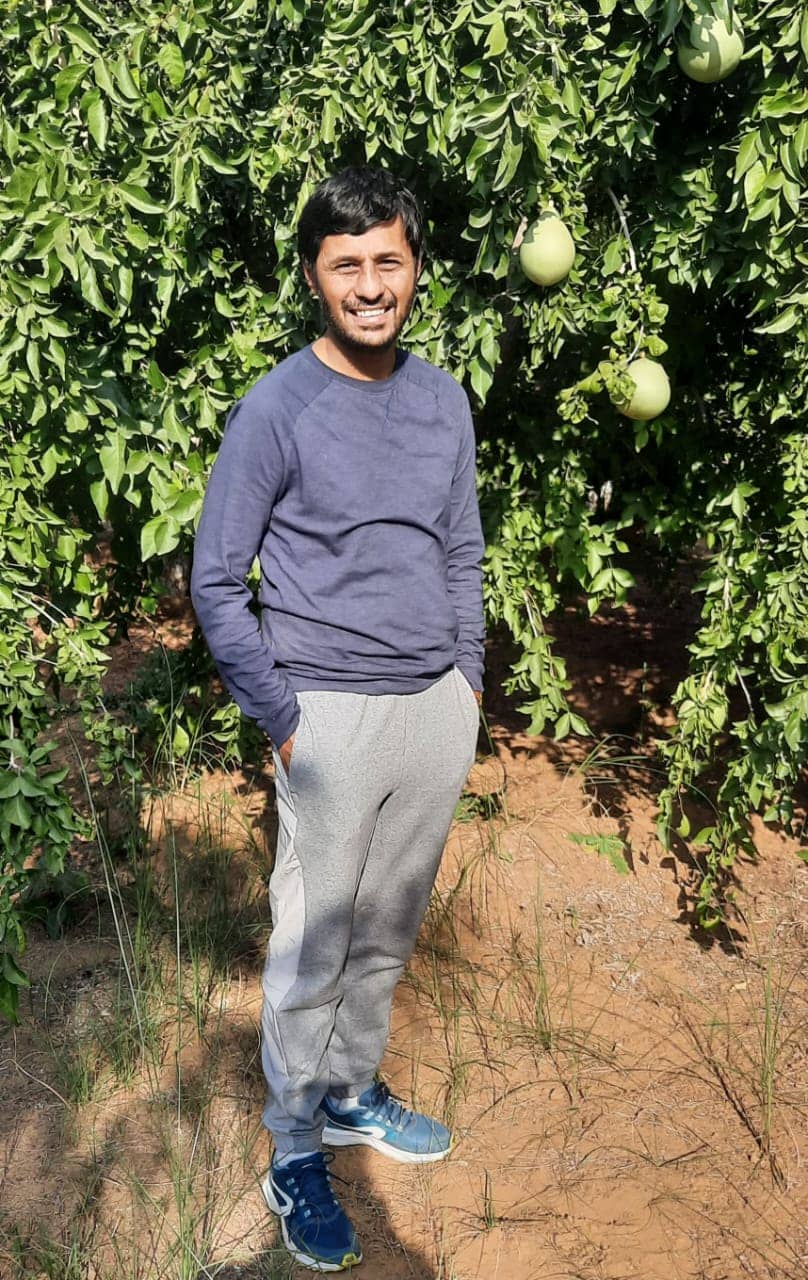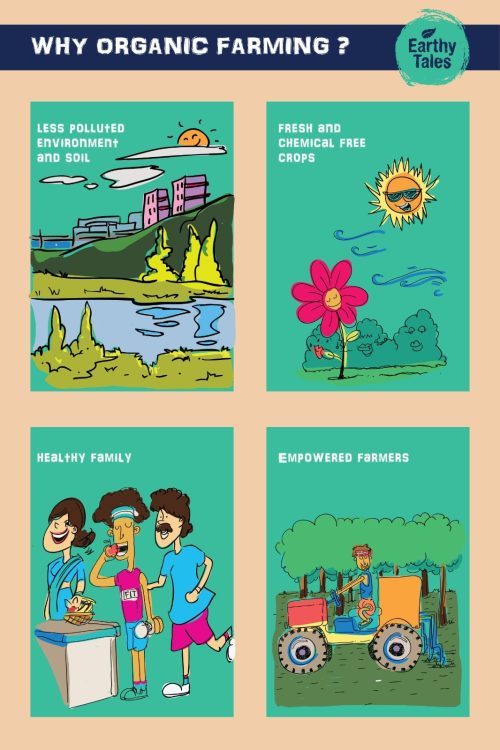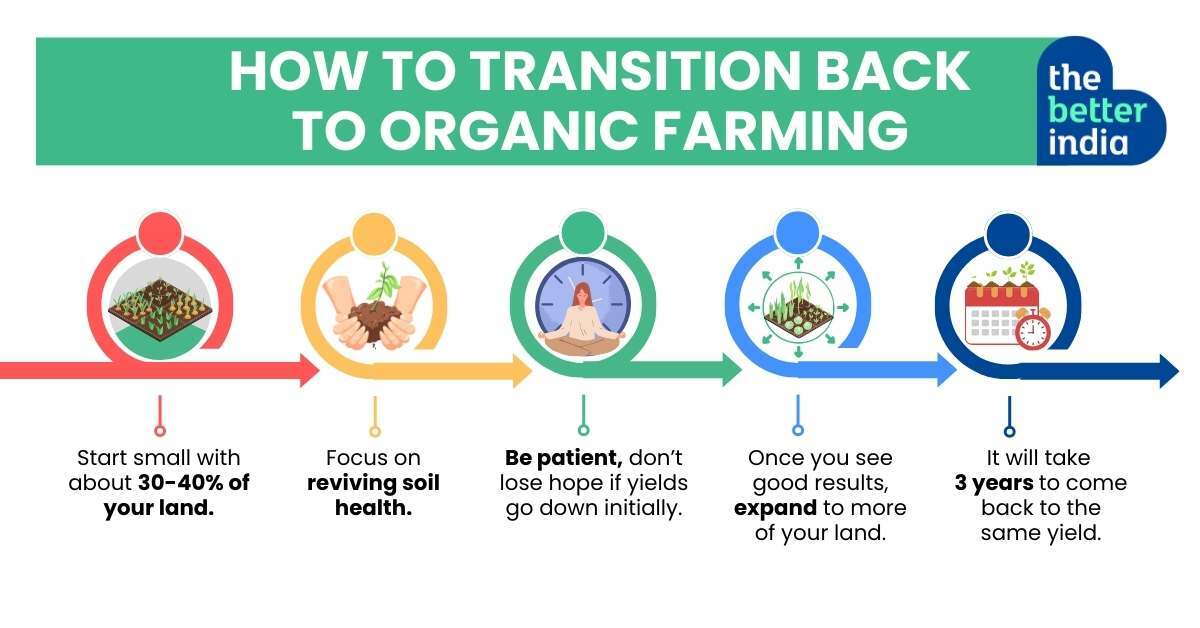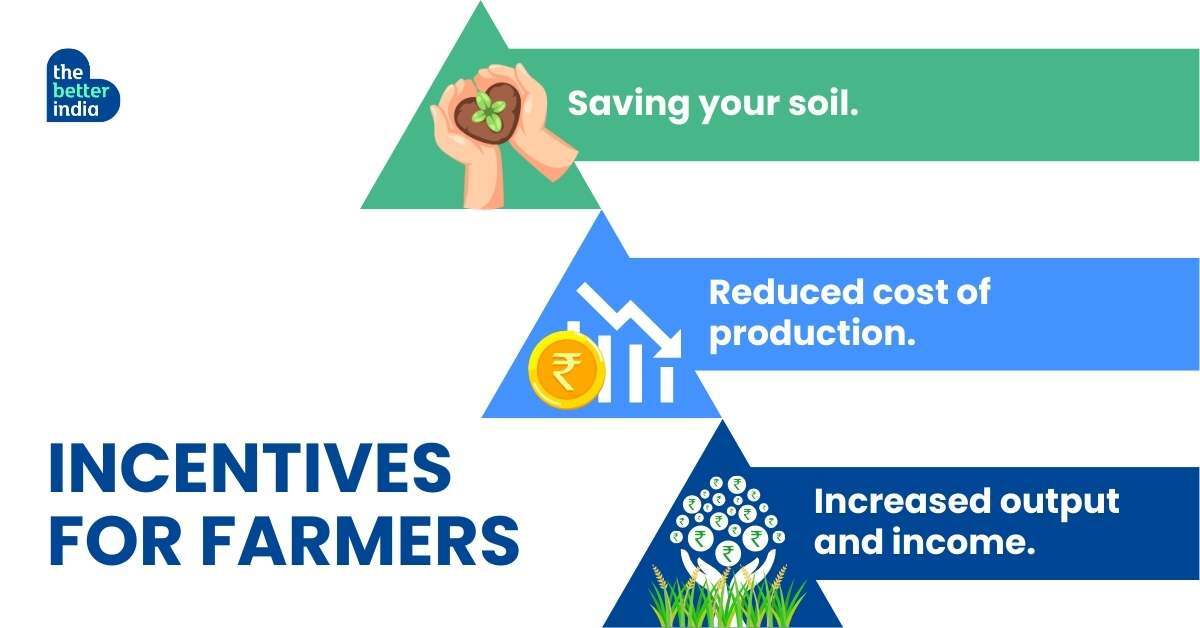Friday nights for Deepak Sabharwal were rather unique. The Delhi-NCR resident would rush after work to catch a bus to Pushkar, Rajasthan. He traded his formal shirts and pants for cargoes quickly and travelled over 400 km.
While people lazed around at home or spent time meeting friends and family, he . For two days, he would live amidst nature, with no contact of any sort with the outside world.
There was no light at night, no air conditioning, no laptops and no network for these two days. He would start his day by visiting the farms and getting his hands dirty. This routine continued for almost three years.
But one fine day, a label startled him.
“The pesticides that we were using had the word poison written on them in three languages. What were we growing?” wonders Deepak in a conversation with The Better India.
The realisation that they were feeding poison to the soil and plants, and further consuming and selling this was a hard pill to swallow for this MBA graduate with a high-flying corporate career. As he studied ways to start organic farming, he was hit by another blow.
His mother had been diagnosed with cancer.

Deepak is on a mission to spread organic farming across the country.
This was the moment of truth for the 48-year-old. From here on, all his efforts were directed towards moving to organic farming on their 21-acre land. Wanting to spread the fruits of this natural labour, he started selling this produce in Delhi-NCR.
With a mission to provide organic food to consumers and to shift to organic farming, he started Earthy Tales in 2017. Today, they work with over 500 farmers across the country and have served 15,000 consumers, making a turnover of Rs 4 crore in FY 2023-24.
Deepak earlier used to grow amla (gooseberry), fruits and vegetables in the farm.

When the cost accountant first came across the harmful pesticides being used on the crops, he spent several sleepless nights. To learn about organic farming practices, he took a sabbatical from his job at General Electric (GE) and spent a few months visiting farmers in Maharashtra, Himachal Pradesh and Rajasthan itself.
Seeing farmers in Jalgaon and other regions of Maharashtra practise organic farming made the cost accountant understand that farming can be done the way nature intended it.
“Before the green revolution, farmers in India were essentially practising organic farming. All we had to do was go back several decades,” he shares.
While it sounds great on paper, once the soil gets used to chemical fertilisers, it takes a lot of time and patience to revive it or bring it back to its former glory.
“Fundamentally, soil or plants don’t need anything non-natural. Chemicals are alien, but once you’ve pumped them in for decades, they get used to it. So we started with a small portion of land. The first and most important thing to do is ,” adds the entrepreneur.
He started using cow dung and vermicompost. While in chemical farming one tends to kill pests, one of the principles of natural farming is that pests are integral and can co-exist.
Once the soil started regaining its health, he started multi-cropping. Pulses and flowers would be grown together. After a few months, he saw good results.
While the output might not have been equal to the one earlier, it was free of harmful chemicals.
Keeping at this for a couple of years brought their harvest back to original numbers. Buoyed by the results, he expanded to growing other pulses at the farm as well.

He started getting this fresh produce home and distributing it to friends and family. This was the same time when awareness about the importance of eating natural food was growing.
Realising the inherent demand, he set up the company, formed a Facebook page and WhatsApp business account. Interestingly, he was one of the first adapters of WhatsApp business in India, and has also been featured as a case study for effectively using the platform.
Deepak would personally deliver the fruits and vegetables and groceries to customers in his Maruti Suzuki Swift car; embodying the ‘Direct-To-Consumer’ (DTC) principle quite literally!
“I would get the goods by bus and deliver it in Delhi-NCR,” he says. The farm-to-fork business grew through word of mouth and after personally delivering goods to over 500 customers, the former finance professional expanded the Earthy Tales team.
Today, the certified organic brand sells over 300 products, including fruits, vegetables, ghee, oil, pulses and value added products like jams. Fruits and vegetables are delivered in Delhi-NCR, while the other products are delivered across India.
The bestsellers, besides the fruits and vegetables, are cold-pressed oils, stone chakki flours, according to Deepak.
As demand increased, they started mentoring . They urged them to shift to organic farming and gave them a platform to sell their produce too.

He shares that convincing farmers was a challenge as they were worried about the yield and market for the produce.
“We help farmers by providing them market linkages and buying their produce at a rate higher than the ones they receive generally. Farmers can get the same yield they receive currently only after a period of three years. It’s not going to happen overnight,” explains the CEO.
Earthy Tales has a team on the ground that trains farmers and provides them with inputs, market linkages and getting an organic certification. The farmers are asked to start with 30-50 percent of their land and then increase it to their entire farm.
Jatin Kumar Saini, a farmer from Jhunjhunu district in Rajasthan, used to grow grains on his three-acre land. “But that wasn’t very profitable,” he shares.
A team from Earthy Tales visited his farm about three years back and asked him to start growing vegetables on a small portion of land. As this started giving him a good return, today he grows cucumbers, chillies and other vegetables in his entire farm.
“My income has increased almost four times after the interventions from Earthy Tales,” he says.
The farm-to-fork company has trained over 500 farmers so far. It is incubated by the government under the Ministry of Agriculture’s Rashtriya Krishi Vikas Yojana (RKVY) – Remunerative Approaches for Agriculture and Allied sector Rejuvenation (RAFTAAR) scheme.
Earthy Tales has also set up two farmer training and collection centres in Rajasthan and Himachal Pradesh.
What started with Deepak delivering products twice a week in his car now delivers products twice a day in Delhi-NCR and 11 other cities. “We want to become a farmer’s best friend,” says Deepak.
Edited by Padmashree Pande, Images Courtesy Deepak Sabharwal
While people lazed around at home or spent time meeting friends and family, he . For two days, he would live amidst nature, with no contact of any sort with the outside world.
There was no light at night, no air conditioning, no laptops and no network for these two days. He would start his day by visiting the farms and getting his hands dirty. This routine continued for almost three years.
But one fine day, a label startled him.
“The pesticides that we were using had the word poison written on them in three languages. What were we growing?” wonders Deepak in a conversation with The Better India.
The realisation that they were feeding poison to the soil and plants, and further consuming and selling this was a hard pill to swallow for this MBA graduate with a high-flying corporate career. As he studied ways to start organic farming, he was hit by another blow.
His mother had been diagnosed with cancer.

Deepak is on a mission to spread organic farming across the country.
This was the moment of truth for the 48-year-old. From here on, all his efforts were directed towards moving to organic farming on their 21-acre land. Wanting to spread the fruits of this natural labour, he started selling this produce in Delhi-NCR.
With a mission to provide organic food to consumers and to shift to organic farming, he started Earthy Tales in 2017. Today, they work with over 500 farmers across the country and have served 15,000 consumers, making a turnover of Rs 4 crore in FY 2023-24.
A weekend visit that sparked an idea
Deepak earlier used to grow amla (gooseberry), fruits and vegetables in the farm.

When the cost accountant first came across the harmful pesticides being used on the crops, he spent several sleepless nights. To learn about organic farming practices, he took a sabbatical from his job at General Electric (GE) and spent a few months visiting farmers in Maharashtra, Himachal Pradesh and Rajasthan itself.
Seeing farmers in Jalgaon and other regions of Maharashtra practise organic farming made the cost accountant understand that farming can be done the way nature intended it.
“Before the green revolution, farmers in India were essentially practising organic farming. All we had to do was go back several decades,” he shares.
While it sounds great on paper, once the soil gets used to chemical fertilisers, it takes a lot of time and patience to revive it or bring it back to its former glory.
“Fundamentally, soil or plants don’t need anything non-natural. Chemicals are alien, but once you’ve pumped them in for decades, they get used to it. So we started with a small portion of land. The first and most important thing to do is ,” adds the entrepreneur.
He started using cow dung and vermicompost. While in chemical farming one tends to kill pests, one of the principles of natural farming is that pests are integral and can co-exist.
Once the soil started regaining its health, he started multi-cropping. Pulses and flowers would be grown together. After a few months, he saw good results.
While the output might not have been equal to the one earlier, it was free of harmful chemicals.
Keeping at this for a couple of years brought their harvest back to original numbers. Buoyed by the results, he expanded to growing other pulses at the farm as well.

He started getting this fresh produce home and distributing it to friends and family. This was the same time when awareness about the importance of eating natural food was growing.
Realising the inherent demand, he set up the company, formed a Facebook page and WhatsApp business account. Interestingly, he was one of the first adapters of WhatsApp business in India, and has also been featured as a case study for effectively using the platform.
Deepak would personally deliver the fruits and vegetables and groceries to customers in his Maruti Suzuki Swift car; embodying the ‘Direct-To-Consumer’ (DTC) principle quite literally!
“I would get the goods by bus and deliver it in Delhi-NCR,” he says. The farm-to-fork business grew through word of mouth and after personally delivering goods to over 500 customers, the former finance professional expanded the Earthy Tales team.
Today, the certified organic brand sells over 300 products, including fruits, vegetables, ghee, oil, pulses and value added products like jams. Fruits and vegetables are delivered in Delhi-NCR, while the other products are delivered across India.
The bestsellers, besides the fruits and vegetables, are cold-pressed oils, stone chakki flours, according to Deepak.
Motivating farmers to farm organic
As demand increased, they started mentoring . They urged them to shift to organic farming and gave them a platform to sell their produce too.

He shares that convincing farmers was a challenge as they were worried about the yield and market for the produce.
“We help farmers by providing them market linkages and buying their produce at a rate higher than the ones they receive generally. Farmers can get the same yield they receive currently only after a period of three years. It’s not going to happen overnight,” explains the CEO.
Earthy Tales has a team on the ground that trains farmers and provides them with inputs, market linkages and getting an organic certification. The farmers are asked to start with 30-50 percent of their land and then increase it to their entire farm.
Jatin Kumar Saini, a farmer from Jhunjhunu district in Rajasthan, used to grow grains on his three-acre land. “But that wasn’t very profitable,” he shares.
A team from Earthy Tales visited his farm about three years back and asked him to start growing vegetables on a small portion of land. As this started giving him a good return, today he grows cucumbers, chillies and other vegetables in his entire farm.
“My income has increased almost four times after the interventions from Earthy Tales,” he says.
The farm-to-fork company has trained over 500 farmers so far. It is incubated by the government under the Ministry of Agriculture’s Rashtriya Krishi Vikas Yojana (RKVY) – Remunerative Approaches for Agriculture and Allied sector Rejuvenation (RAFTAAR) scheme.
Earthy Tales has also set up two farmer training and collection centres in Rajasthan and Himachal Pradesh.
What started with Deepak delivering products twice a week in his car now delivers products twice a day in Delhi-NCR and 11 other cities. “We want to become a farmer’s best friend,” says Deepak.
Edited by Padmashree Pande, Images Courtesy Deepak Sabharwal
